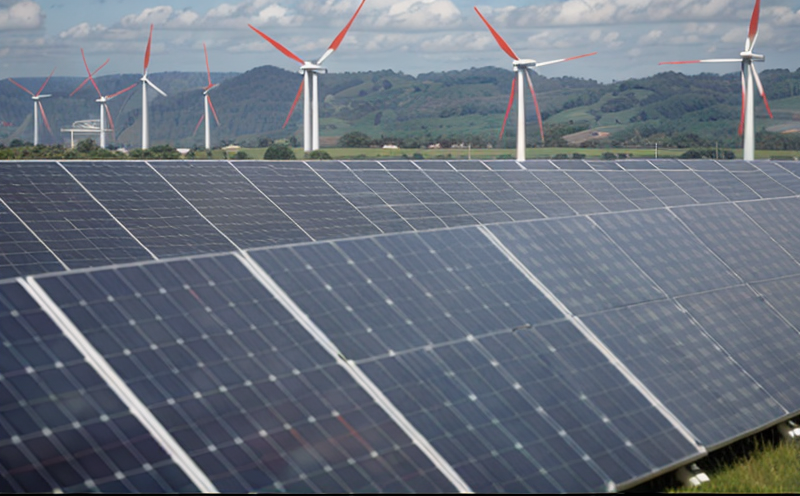Calorific Value (Heating Value) Testing
The calorific value or heating value of a fuel is one of the most important parameters in the energy sector, particularly within agriculture and forestry testing. It is defined as the amount of heat released when a unit mass or volume of fuel undergoes complete combustion with oxygen. This measurement is crucial for understanding the energy content of biomass fuels such as wood pellets, sawdust, straw, and other agricultural by-products used in renewable energy systems.
In agriculture, calorific value testing plays a pivotal role in optimizing fuel efficiency and reducing costs associated with energy production from renewable sources. For instance, when farmers or bioenergy plant operators use calorific value data to select the most efficient fuel for their boilers or furnaces, they can minimize waste and maximize output. This is especially significant as more countries around the world seek to increase their reliance on renewable energy.
The testing process itself involves several steps. First, a representative sample of the biomass material must be prepared in accordance with international standards such as ISO 17823:2016 for solid fuels or ASTM D5865-19 for wood and other lignocellulosic materials. Once prepared, the sample is combusted in an oxygen-rich environment, typically a bomb calorimeter, which measures the heat released during combustion.
The accuracy of the calorific value testing process depends heavily on several factors including sample preparation, instrument calibration, and environmental conditions. To ensure consistency across various samples and locations, laboratories must adhere strictly to established protocols. This includes maintaining precise temperature control, ensuring consistent oxygen supply, and using accurate balances for weighing samples.
Understanding the calorific values of different types of biomass fuels is essential not only for optimizing energy production but also for evaluating carbon emissions. By comparing the calorific value of a particular fuel with its carbon content, one can estimate the net CO2 emissions associated with its use. This information is vital for meeting environmental regulations and sustainability goals.
Moreover, calorific value testing helps in assessing the quality and consistency of biomass fuels over time. Variations in heating values could indicate issues such as moisture content or contamination that need to be addressed. Regular monitoring through calorific value tests allows for proactive management of fuel quality, ensuring reliable performance of energy systems.
In summary, calorific value testing is a cornerstone of sustainable and efficient renewable energy production in agriculture and forestry sectors. It enables precise measurement and optimization of fuel usage while providing valuable insights into environmental impacts. As global demand for cleaner energy sources continues to grow, accurate and consistent calorific value data becomes increasingly critical.
Industry Applications
The application of calorific value testing extends beyond just biomass fuels; it also encompasses a wide range of other materials used in renewable energy systems. For instance, in the production of biogas, measuring the calorific value helps in determining the efficiency of anaerobic digestion processes. By knowing the exact heating value of the produced biogas, operators can better predict its performance when fed into engines or turbines for power generation.
In forestry, calorific value testing is used to evaluate the potential of logging residues and sawdust as fuel sources. This helps in deciding whether these materials are suitable candidates for conversion into bioenergy products like pellets or briquettes. Accurate calorific value data ensures that only high-quality feedstocks are utilized, thereby improving overall energy yield.
For agricultural waste management, calorific value testing serves dual purposes: it aids in waste disposal decisions by identifying which types of organic matter can be profitably converted into bioenergy; and it supports the development of new conversion technologies by providing essential data on fuel characteristics. Understanding these parameters is crucial for designing efficient systems that convert biomass into electricity or heat without sacrificing environmental benefits.
Additionally, calorific value testing plays a key role in compliance with various international standards aimed at promoting sustainable practices within industries reliant on renewable resources. Compliance officers and quality managers rely heavily on this information to ensure their operations meet regulatory requirements related to energy efficiency and carbon footprint reduction.
Eurolab Advantages
At Eurolab, we pride ourselves on delivering unparalleled accuracy and reliability in calorific value testing. Our state-of-the-art facilities are equipped with equipment that adheres strictly to international standards such as ISO 17823:2016 for solid fuels, ensuring consistent and precise results every time.
- Accurate Results: We employ highly skilled technicians who use advanced instruments to conduct thorough analyses. This guarantees accurate calorific value measurements that are trustworthy and repeatable.
- Dedicated Specialists: Our team includes experts in agriculture, forestry, and renewable energy systems, allowing us to provide tailored advice based on specific industry needs.
- Comprehensive Reporting: Alongside quantitative data, we offer detailed reports that interpret the results within broader market trends and regulatory frameworks. This aids clients in making informed decisions about their operations.
- Consistency Across Samples: Our strict adherence to standard procedures ensures consistent outcomes regardless of sample type or batch number. This consistency is crucial for maintaining high standards throughout production processes.
- Environmental Focus: Understanding the environmental impact of calorific value testing, Eurolab prioritizes methods that minimize waste and optimize resource utilization. This aligns with our commitment to sustainability in all aspects of our work.
Beyond technical excellence, Eurolab stands out by offering personalized service tailored to each client’s unique requirements. Whether you need assistance selecting appropriate fuel sources or optimizing existing systems for better performance, our experts are here to guide you through every step of the process.





